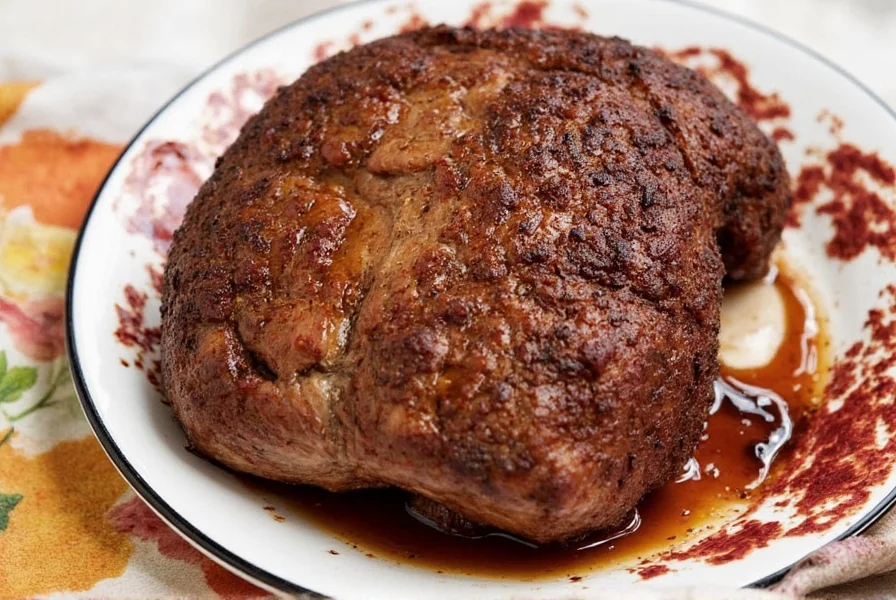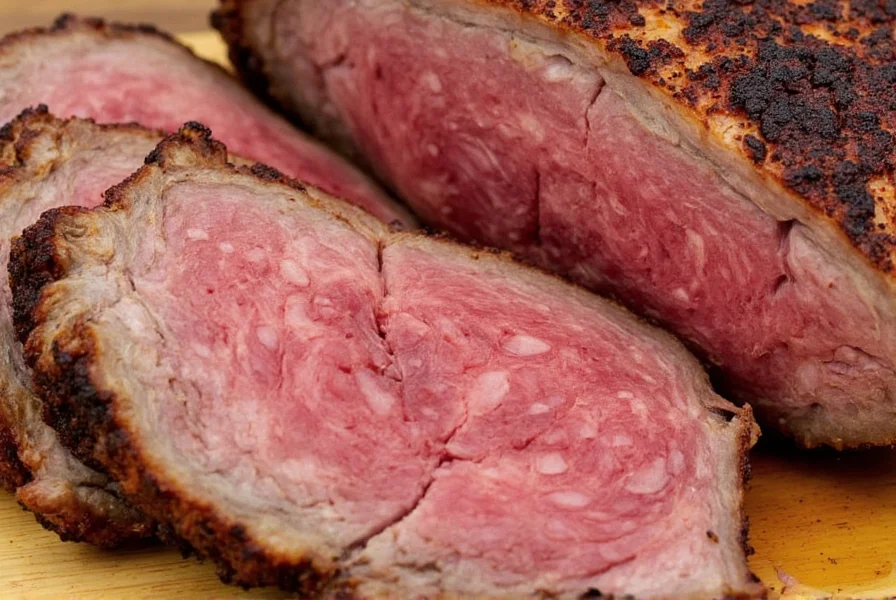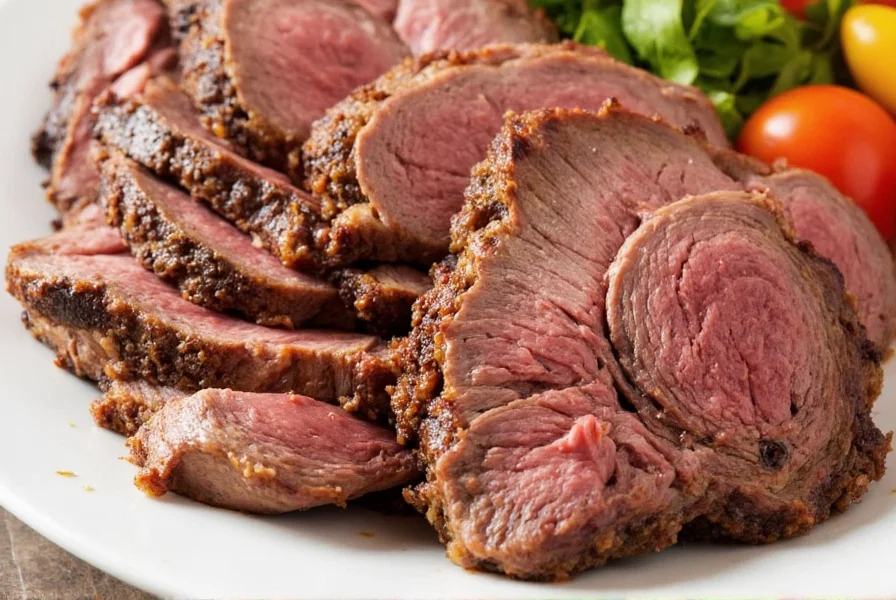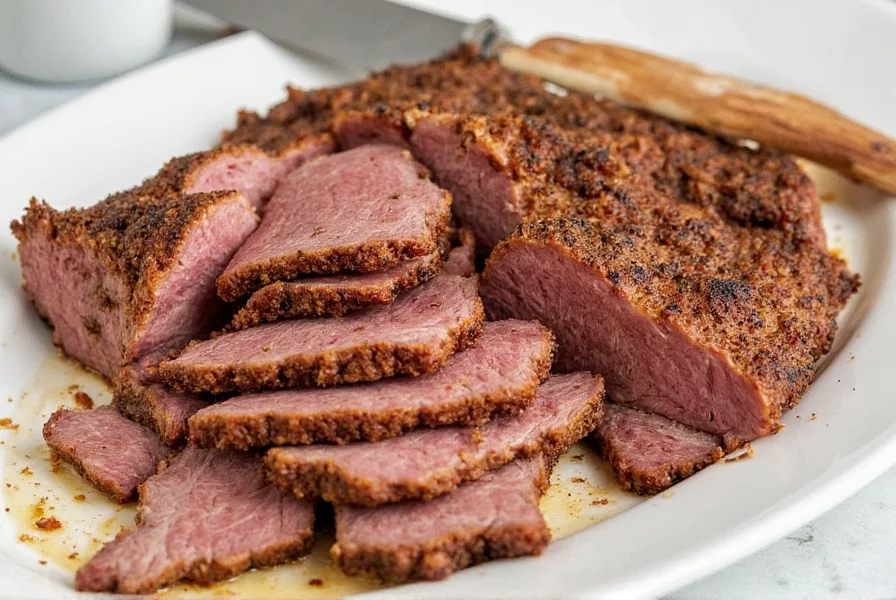Roasting brisket in the oven is a straightforward method to achieve tender, flavorful meat without a smoker. This guide provides a step-by-step process, including seasoning tips, temperature control, and resting instructions for perfect results every time.
Step-by-Step Guide: How to Roast Brisket in the Oven
Ingredients You'll Need
- 1 whole packer-cut brisket (8–12 lbs)
- 2 tbsp coarse salt
- 1 tbsp black pepper
- 1 tbsp garlic powder
- 1 tbsp onion powder
- 1 tbsp smoked paprika
- 1 tsp cayenne (optional for heat)
- 1 cup beef broth
Tools You'll Use
- Oven-safe roasting pan with rack
- Meat thermometer
- Aluminum foil
- Basting brush
Instructions
- Prep the Brisket: Trim excess fat to about ¼ inch thickness. Mix all spices to create your dry rub. Generously coat both sides of the brisket with the rub. Wrap and refrigerate overnight for deeper flavor infusion.
- Preheat Oven: Set oven to 275°F (135°C).
- Place Brisket in Pan: Put the brisket fat-side up on a roasting rack in a large pan. Add beef broth to the bottom of the pan (not touching the meat) to keep the environment moist.
- Roast Low and Slow: Cover tightly with aluminum foil and roast for approximately 1 hour per pound. So, an 8-pound brisket would take around 8 hours.
- Check Internal Temperature: Insert a meat thermometer into the thickest part. The ideal range is 195–205°F. At this stage, the collagen has melted, resulting in tender meat.
- Rest Before Slicing: Let the brisket rest for at least 30 minutes, preferably 1–2 hours. This allows juices to redistribute, preventing dry slices.
- Slice Against the Grain: Use a sharp knife and cut across the grain for maximum tenderness.

| Spice | Type | Shelf Life | Best Use |
|---|---|---|---|
| Black Pepper | Whole/Ground | 4 Years / 2–3 Years | General seasoning |
| Paprika | Ground | 2–3 Years | Color & mild heat |
| Cumin | Whole/Ground | 4 Years / 2–3 Years | Mexican & Middle Eastern dishes |
| Oregano | Dried | 3 Years | Mediterranean cuisine |
| Garlic Powder | Ground | 3–4 Years | All-purpose savory dishes |
Essential Tools & Gear for Perfect Brisket Roasting
- Oven-Safe Roasting Pan: A heavy-duty stainless steel or enameled cast iron roasting pan distributes heat evenly and retains warmth.
- Wire Rack: Keeps the brisket elevated above the liquid, allowing heat to circulate for even cooking.
- Digital Meat Thermometer: Accuracy is key when aiming for that perfect doneness. Instant-read thermometers are best for checking internal temps quickly.
- Large Cutting Board: Look for one with juice grooves to catch runoff while slicing.
- High-Quality Chef's Knife: A sharp, long-bladed knife makes clean, even cuts through the dense meat.
- Aluminum Foil & Parchment Paper: Essential for wrapping the brisket during the resting phase and keeping things tidy.

Frequently Asked Questions
How long does it take to roast brisket in the oven?
The general rule is about 1 hour per pound at 275°F (135°C). An 8-12 pound brisket will typically take 8-12 hours. The most reliable method is to cook until the internal temperature reaches 195-205°F in the thickest part, which indicates the collagen has properly broken down for tender results.
What temperature should I use for roasting brisket?
Low and slow is the key! We recommend 275°F (135°C) for optimal results. This temperature allows the connective tissues to break down slowly without drying out the meat. Some recipes go as low as 225°F, but 275°F offers a good balance between cooking time and tenderness.
Do I need to wrap the brisket while roasting?
Wrapping (often called the "Texas crutch") is optional but can help with moisture retention. Many pitmasters wrap when the internal temperature reaches 150-160°F to push through the "stall" period where temperature stops rising. You can use aluminum foil or butcher paper. Our recipe calls for covering with foil throughout cooking to maintain moisture.
How do I know when the brisket is done?
The most reliable method is using a meat thermometer to check for an internal temperature of 195-205°F in the thickest part. At this temperature range, the collagen has converted to gelatin, giving you that perfect tender texture. The meat should also feel probe-tender (a thermometer or skewer should slide in with little resistance).
Why is my brisket dry or tough?
Dry or tough brisket usually means either undercooked (collagen didn't have time to break down) or overcooked (too much moisture evaporated). Ensure you're cooking to the proper internal temperature (195-205°F), not just by time. Also, remember to let it rest for at least 30 minutes (preferably 1-2 hours) before slicing to allow juices to redistribute.
Should I trim the fat before roasting?
Yes, but not all of it. Trim the hard fat cap to about ¼ inch thickness. This provides flavor and moisture during cooking while preventing excessive fat from rendering out. Too much fat can prevent your rub from adhering properly and create uneven cooking.
Final Thoughts
Mastering the art of roasting brisket in the oven is all about understanding your ingredients and tools. By following this step-by-step guide, you'll achieve restaurant-quality results with minimal effort. Remember: low-and-slow cooking, proper resting, and slicing against the grain are key to tender, flavorful brisket every time.












 浙公网安备
33010002000092号
浙公网安备
33010002000092号 浙B2-20120091-4
浙B2-20120091-4